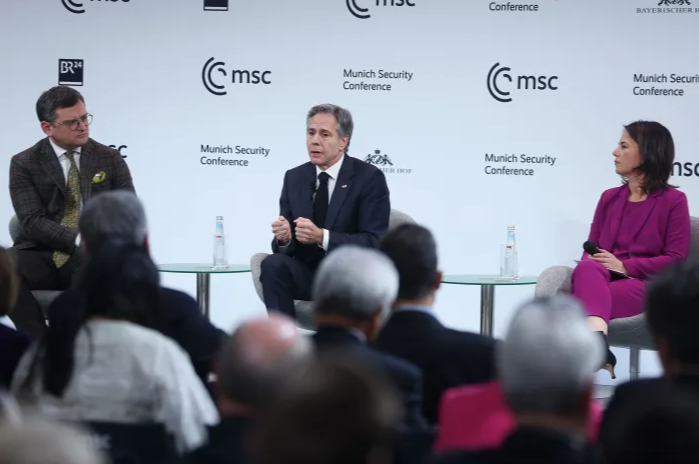-
Blinken warns that China may supply weapons to Russia
-
China refuses even to call Blinken-Wang talks a formal meeting
The US and China came to Germany last weekend looking to patch up a new rift opened by the uproar over a Chinese balloon. But a meeting between their top diplomats showed how difficult it will be to compromise.
Secretary of State Antony Blinken and China’s State Councilor Wang Yi traded barbs on everything from the balloon and Taiwan to North Korea and Russia in their first meeting since the high-altitude craft traversed the US and provoked an acrimonious round of finger pointing. The top US diplomat also said China was weighing whether to give Russia weapons for its war in Ukraine, a move that would ratchet up tension even further.
It all underscored how, for all the claims from President Joe Biden and President Xi Jinping about their desire to steady ties, neither side seems capable of doing so. What was meant to pave the way for a Blinken trip to Beijing — he canceled a visit once the balloon was spotted — only seemed to make prospects more remote. And while Biden said last week he would speak with Xi to defuse tensions, there was no indication of when that might happen.
“The relationship is becoming more brittle,” said Kori Schake, director of foreign and defense policy studies at the American Enterprise Institute who has previously worked in the US State Department and Pentagon. “If China mirrors to Russia the assistance the West is providing Ukraine, it will cement the Russo-Chinese alliance and also Western perceptions of China as a malevolent international force.”
The rest of the world is watching. Leaders from places like Brazil and Singapore have warned about the military and economic spillovers of a prolonged clash between the world’s two biggest economies — and expressed their unwillingness to choose between them.
The rocky meeting and sharp rhetoric around it demonstrated just how sour the US-China relationship is, and how both sides appear willing to squabble over petty issues. In its readout of the talks, China refused even to call it a meeting, referring to it as an “informal contact” and arguing that the two only spoke because the US made a request.
In keeping with an aggressive counter-messaging campaign the administration rolled out before Russia’s invasion of Ukraine, Blinken quickly did interviews with Sunday morning shows back home. He made sure Americans turning on their television sets Sunday morning heard the warning about the growing Russia-China partnership.
“We are very concerned that China is considering providing lethal support to Russia in its aggression against Ukraine,” Blinken told NBC’s “Meet the Press.” “And I made clear that that would have serious consequences in our relationship.”
China’s Wang rejected what he called the US’s “finger-pointing” when it comes to Russia, and said China would release a new peace proposal for Ukraine in the coming days that would be in keeping with previous efforts by Xi. Wang, who was set to fly to Moscow for meetings with top Russian officials after his stay in Munich, also met Ukraine’s foreign minister and condemned attacks on nuclear power stations.
“We oppose attacks on nuclear power stations, attacks on civilian nuclear facilities,” Wang said. “We have to work to prevent nuclear proliferation and nuclear disasters.”
‘Almost Hysterical’
But the US appeared in no mood to consider that plan, especially given its accusation of China’s deepening ties with Russia. For months the US had warned China against providing more support to President Vladimir Putin.
What the world heard from Blinken about China’s role “underscores that we’re going to have to really up our diplomatic game,” Fiona Hill, a senior fellow at the Brookings Institution, said on CBS’s “Face the Nation.” “A lot of other countries just don’t buy that there’s as big an issue as we see with Russia’s invasion of Ukraine.”
Blinken had been caught off guard earlier Saturday after Wang lashed out at the US during a speech, calling Biden’s decision to shoot down the balloon over American airspace and the heightened state of alert “incomprehensible and almost hysterical.”
The US said the balloon over the US was part of a fleet of spy devices directed by China’s People’s Liberation Army. China countered that the craft was a harmless weather balloon that had blown off course and claimed the US had flown similar airships over China — claims the White House has rejected.
‘Better Than Nothing’
What’s unclear is whether the latest squabble on the sidelines of the Munich Security Conference represented some healthy venting that they can now get past, or yet another signal that the US and China remain stuck in a cycle of recriminations that is only going to push them closer to conflict.
There are areas where the two sides would benefit from cooperation, such as climate change and nuclear proliferation.
In a readout from the meeting, State Department spokesman Ned Price said Blinken had condemned a new intercontinental ballistic missile launch by North Korea “and emphasized the need for responsible powers to respond to such significant international challenges” — diplomatic language for the US demand that China exert its influence and curb such launches.
“A meeting is always better than nothing,” said Henry Wang Huiyao, founder of the Center for China and Globalization, a policy research group in Beijing. “Both sides appeared to be tough — they both have domestic audiences to cater to.”
–With assistance from Jing Li.





